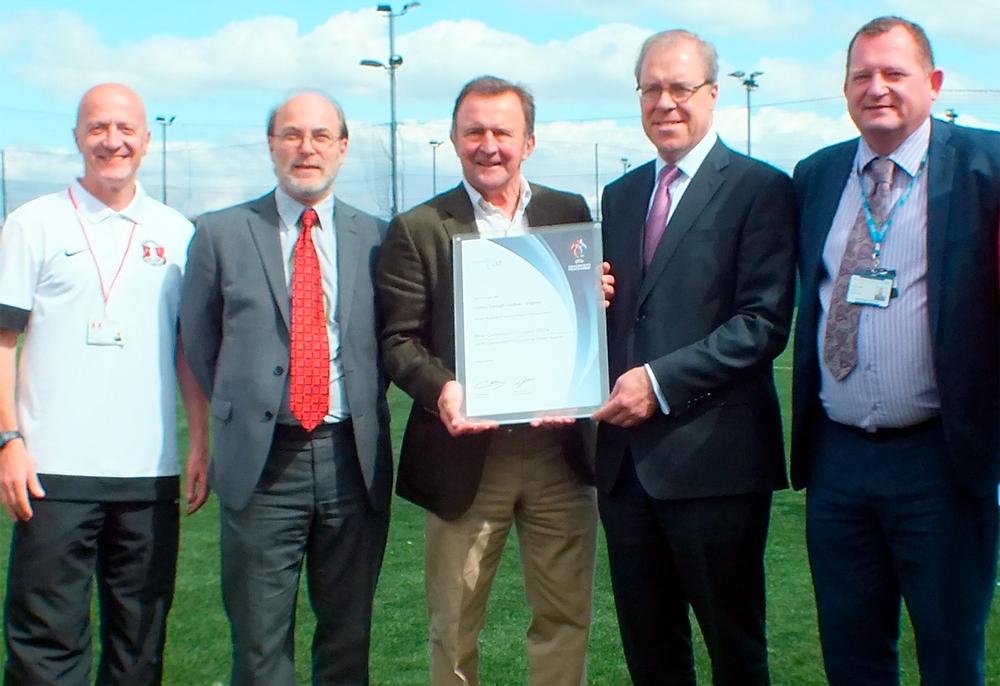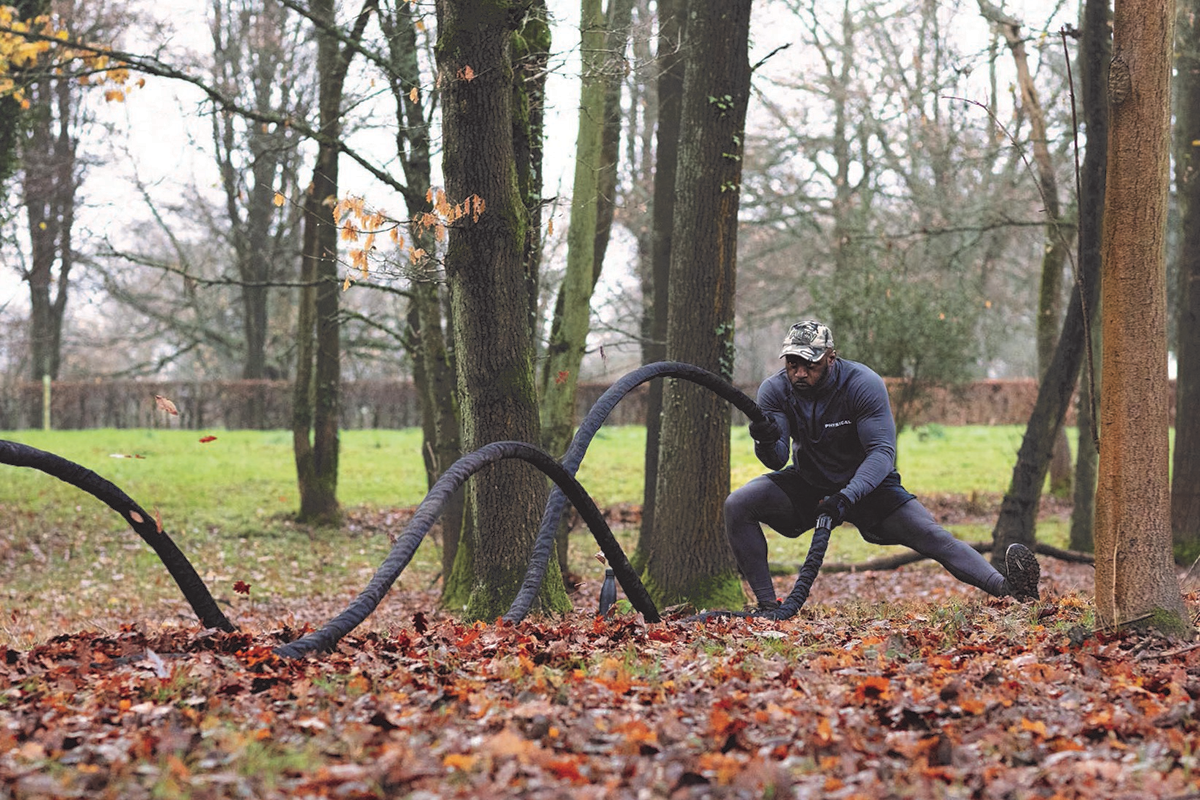Healthy Body Healthy Mind
A £2m programme that uses sport to improve the lives of people with mental health problems was announced in October. Can the new initiative, led by Sport England and mental health charity Mind, make a difference?

*Names changed to protect identity
Twenty year old Londoner Peter* lacked confidence. He was too eager to please, anxious to fit in, and this got him into trouble. He fell in with a bad crowd, drank, smoked and ate too much. He was too impulsive and by his own admission, he didn’t do anything constructive with his days. He wasn’t working and only had this one group of mates. “I felt my life was going in the wrong direction,” he says.
Not long after the 2010 World Cup, however, Peter started playing football. Since then, his life has got better.
Non-competitive treatment
At the weekly football session, Peter met Michael. The 24-year-old had been diagnosed with paranoid schizophrenia. Because of his mental health issues, he lacked confidence and was anxious about meeting new people. Michael wasn’t at work, but when he did get some money, he just wasted it on drugs. “I thought I needed them to relax and to enjoy myself,” he says. Playing football taught him otherwise.
Peter and Michael didn’t join a football club. A cut and thrust, win at all costs environment where players were pushed to improve their own performance or risk letting the team down would have only made things worse for them. Instead, they took part in fun coaching sessions, designed specifically for people with mental health issues. The sessions were run by Leyton Orient Football Club community coaches – coaches who’d had mental health training – and organised by the London Playing Fields Foundation, as part of their Coping through Football project.
Four years on, and Michael is off drugs. He swims, goes to the gym, gained a catering qualification and works part time in a café. He’s even thinking of joining a Sunday League football team. “I’m no longer in that dark place, I feel more in control of my life,” he says. Peter has lost lots of weight, quit smoking and drinks less. He’s made new friends who understand him and his previous problems and has started volunteering as a boxing coach.
Direct action
Sport England, the mental health charity, Mind, and the government hope that the new £2m scheme they launched this October will use sport to help 75,000 people who, like Peter and Michael, have mental health issues; 25,000 during the first 15 months. The new scheme is set to start next year and will run across eight areas in London, the West Midlands, the north west and the north east. It will cost £2m – £1.5m Lottery funding through Sport England, the rest raised by Mind. The government hasn’t yet released precise details of the rollout, but there will most likely be specific targeted and adapted activities, support for people who want to join mainstream clubs and take up new sports, taster sessions, fitness classes and support groups.
“There is clear evidence that physical activity as part of a rehabilitation programme improves recovery speed and reduces health costs,” says Mike Diaper, Sport England’s executive director for community sport. According to Mind, research shows that outdoor exercise can reduce depression and anxiety. The charity hopes that the new project will encourage more people living with mental health problems to take up sport.
“Structured physical activity programmes can help people recover from a mental health problem and stay well long term,” says Paul Farmer, Mind’s chief executive. Mind’s information manager, Sam Challis, adds that for a person with mild depression or anxiety, physical activity gets the endorphins going and can lift their mood almost immediately.
“Just being outdoors can help people,” he says. “There’s light and you’re surrounded by nature, away from bustling environments which hold negative associations.”
Department of Health figures show that one in four people in the UK will suffer from mental health problems in their lifetime. That’s anxiety, addiction, obsession, phobia, depression, bipolar disorder, personality disorder, schizophrenia and eating disorders. According to the 2013 Sport and Recreation Alliance report, the Game of Life, schizophrenia and bipolar disorder reduce life expectancy by between 16 and 25 years. People with depression are twice as likely to develop heart disease and 58 per cent more likely to become obese.
The King’s Fund and Centre for Mental Health found that £13bn of NHS expenditure each year is spent on long-term conditions linked to poor mental health and wellbeing.
“The horrible thing about mental health issues is they can strike indiscriminately,” says Alex Welsh, CEO of the London Playing Fields Foundation, which set up the Coping Through Football project in Waltham Forest seven years ago.
“People go through life and all of a sudden something happens. Some cope better than others,” he adds.
Welsh, also a Tottenham Hotspur community coach, adds: “Suicide is the biggest killer of 25- to 28-year-old men, alongside road traffic accidents. There’s an over-reliance on medication as a treatment for mental health problems.
Coping Through Football takes referrals from GPs, NHS home treatment and community outreach teams across London, while early intervention teams send younger people at risk of developing chronic issues. Local Mind groups have also been running sports activities for people with mental health issues. Rochdale has put on taster sessions in Zumba, Bollywood and line dancing, aerobics, tai-chi, yoga, five-a-side football, table tennis and badminton. Brentwood Mind runs a walking group, where people socialise, exercise and explore the local area.
In Croydon, Mind works with Duke McKenzie, to put on boxing fitness classes at the former boxing world champion gymnasium in Crystal Palace.
“People who’ve been on these projects score better on measures for depression and anxiety,” says Richard Paccati, Croydon in Mind’s CEO. “They see the GP less, are less likely to be admitted to hospital and need less medication.”
Keep them coming
A sports session for people with mental health issues is not about training a team or promoting a sport. Nor is it about learning skills and improving performance. All that can create pressure to do well, to be better than someone else and to win. That means more stress and anxiety.
There is, actually, only one aim. That the people who come along to the sessions will come back the next week, so they can continue to benefit from the activity. “This activity is supposed to be therapeutic, to make people feel better,” Sam Challis says. “You don’t want the coach shouting at people to do that little bit extra. The coach needs to have an understanding of why the people are there and what they need.”
Alex Welsh agrees. “You’re not looking for sporting outcomes,” he says. “If the coach shouts anything it’ll be ‘well done’, or ‘good effort’ and it will be targeted at building up an individual’s self-esteem.”
Mike Diaper wants sports professionals to try and understand just how difficult it can be for someone who has a mental health issue to actually come through the door of a sports activity.
“Even if they really enjoy the sport, it can be a really big deal for them,” he says.
Sam Challis says this is because a person may have had a bad experience at school, or be worried that they don’t have the skills to do as well as they want to. Or it might just be because they haven’t done it before. Alex Welsh adds that the environment needs to be relaxed and welcoming. “Like Cheers, the American sitcom – but without the beers,” he says.
Whether involved in the new project or setting up an independent one; it’s important to make links with local authority health practitioners and GPs. It’s the health professionals who will refer people to these activities through local Mind offices.
“Show the health professionals that we’re here to help,” Mike Diaper says. “That sport isn’t all about competition and team sports. That we have more to offer, easy to access activities that don’t require people to have a lot of skills to take part.”
Alex Welsh adds: “The industry needs to show health professionals how sports organisations can add to what they’re already doing. That we can help them achieve their objectives around recovery and help people live normal lives.”
Mike Diaper suggests involving people who have, or have had, a mental health problem, in designing the sessions. “They will know what helped them, what to include that might be of benefit to others, and how to communicate with people who have similar issues,” he says.
“Sport needs to get involved with projects like these. We use public money and the government, local authorities want to see health and economic benefits as well as sporting achievements.”
What sport people do in sessions like these might seem pretty basic, but Alex Welsh argues that organisers and deliverers need to work just as hard to get it right, and do it well, as those who work with the elite performers.
“At elite level its only sport,” Welsh says. “Here, its lives that are at stake.”
Find out more
www.mind.org.uk
www.copingthroughfootball.org
www.mindincroydon.org.uk/active-minds.asp



Centre Manager
Director of Operations
Fitness Motivator
Recreation Assistant/Lifeguard (NPLQ required)
Membership Manager
Recreation Assistant
Swim Teacher
Swim Teacher
Chief Executive Officer, Mount Batten Centre
Swim Teacher
Swimming Teacher
Swimming Teacher
Company profile

Featured Supplier

Property & Tenders
Company: Knight Frank
Company: Belvoir Castle
Company: AVISON YOUNG
Company: London Borough of Bexley
Company: Forestry England














